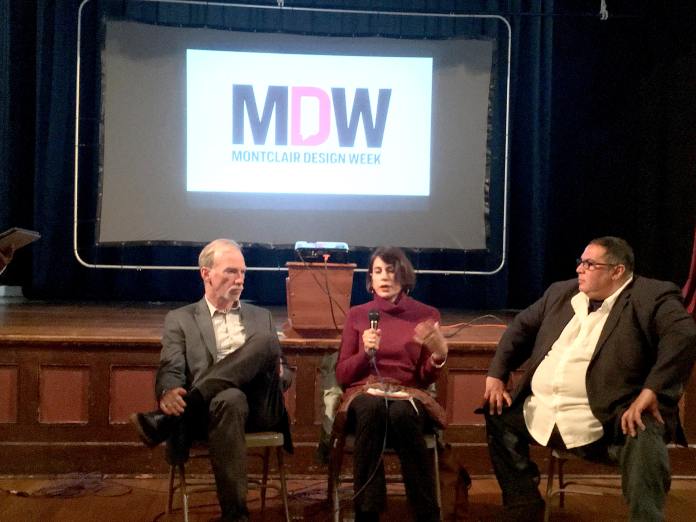
BY KELLY NICHOLAIDES
for Montclair Local
With Montclair set to pick its next mayor in May, Design Montclair identified four points the next leader needs to address: transportation, inclusivity, food systems and livability.
The grassroots community group held a “Designing Your Own Mayor” forum this past Saturday, Oct. 19, at the Unitarian Universalist Congregation at Montclair, as part of its second annual Design Week events. A panel of journalists answered questions regarding the unique challenges facing Montclair. Around 35 attendees broke up into groups of five to brainstorm what qualifications the next mayor should have to address the issues.
Montclair will hold its mayor and council elections this upcoming May, with candidates being finalized in March.
The event became about designing a voter base as much as a mayoral candidate since only eight percent of registered voters went to the polls in the last local election in 2016, noted Design Week founder Petia Morozov.
“The goal of the design process is to mobilize us to create our own leadership. We’d like to begin with these four themes to think about who the next mayor would be through each of these lenses,” said Morozov.

Moderators Julia Harris of Riverbend Coaching and Mike Hill of NJTV asked panelists David Cruz of NJTV News, Julia Martin of Gannett, and Montclair State University journalism professor Steven McCarthy questions reflecting Montclair voters and leadership.
Martin noted that moving Montclair municipal elections to November could improve voter turnout. The larger issues driving low turnout are the “slow death of local journalism” driven by clicks yet trying to keep the public informed and a town that is roughly half renters who may not be quite as vested in Montclair’s issues, Martin said.
“Transparency and accountability are the qualities to look for in a candidate. It’s about continuing to respond to the people who put you in office. The low voter turnout to begin with comes back to accountability and people not involved, so it’s a vicious cycle,” Martin said.
Low voter turnout could be attributed to good existing leadership or voter apathy, Cruz indicated. “You could have a great mayor or maybe a lot of people have checked out and don’t know what’s happening. Most voters are distracted by so much media, and citizen journalism is an oxymoron. There are advocates, but it’s a disservice if they’re really just a front for xyz candidate,” Cruz said. “The problem I see is that you can have a mayor who doesn’t know how to run a city, and the electorate is ignorant on how the town works. For example, they don’t know the differences between zoning and planning boards. There’s not a lot of civic engagement and folks are disorganized because they don’t know what and how these boards work.
You have to design an educated electorate in order to design a mayor, Cruz said.
What galvanizes people to use issues as a motivating force for finding the right leadership?, Hill asked the panelists.
“In general, people like living here. There’s a lot of social media rumbling about things going on under the table, but people like that the downtown is booming, and it’s a good thing that Montclair is keeping the bricks and mortar of business going in the age of Amazon,” Martin said. “Has it gone too far with development? What about parking? Those are the major issues. Developers love it here because it’s a walkable community. But you could be getting to the point where you can’t really walk if you’re not within walking distance of Bloomfield Avenue.”
Montclair’s “Faulkner Act” government structure includes a “weak mayor” who makes appointments to the board of education, the library and the Historic Preservation Commission, said McCarthy. “We can design our next leader and the office of the mayor, but how do you make the office attractive?” McCarthy mused.
Resident Paul Brubaker, a former Montclair Times reporter, stated that when picking a mayor, the community should be galvanized by outrage over development and parking issues. “Who will be that person? We don’t have time. Our quality of life is being impacted. When we design a mayor, we want transparency,” Brubaker said.
During the brainstorming group sessions, residents discussed what qualities are needed to build a good mayor. To address food insecurity, the mayor should be invested in using cooperative collaborations, networking and be a researcher who is willing to address inequalities and run on a social justice platform, one group said. A livable city requires a “dream team” of visionary, apolitical people with engineering, legal and construction backgrounds to tackle housing issues, a second group noted. Maximizing fluidity of existing infrastructure requires a mayor who advocates for transportation improvements and understands the parking issues, a third group concluded.
Making Montclair a livable community requires a mayor with the ability to articulate a long-term vision and who sees the town as a collaborative team, some residents said.
Some said the mayor position should be full time. “This leader would have a track record of broad skill sets. We need someone who has experience with community use of assets like our university as a research arm for the town. University towns are where people want to age in place,” said resident Alison Bauer.
Ensuring that Montclair is inclusive for all races, genders, ages, and economic backgrounds should be a priority, a fourth group concurred. “We want a mayor who is not a developer, is accessible and responsive, and willing to commit full time. The candidate should not be motivated by money and would be vested in education since they represent the people who live here,” said resident Latifah Jannah.
